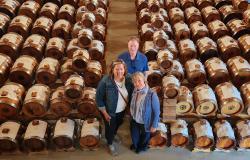 A traditional dry white wine produced here in the northeast Friuli-Venezia Giulia region began the new year without a name.
A traditional dry white wine produced here in the northeast Friuli-Venezia Giulia region began the new year without a name.
Originally known as Tocai, the wine today finds itself caught in a tangled web of regional laws, ministerial decrees and rulings past and future from regional courts and the European Court of Justice in Luxembourg.
According to the Friuli-Venezia Giulia branch of Federdoc, an association which groups together producers of quality wines, ''the situation has become unacceptable. It would almost be comical if it was not so serious from so many points of view''.
''As it stands today, chambers of commerce which must register the Friuli wine for 2008 cannot do so because they don't know what to call it,'' Federdoc added.
The wine can no longer be called Tocai because the Luxembourg court ruled in 2005 that the name was too similar to the one of a traditional Hungarian wine, Tokaj.
The court concluded that based on international treaties, including one in 1993 through which Hungary began to negotiate its entry into the European Union, Italy could not use Tocai because the name 'Tokaj' was an implicit reference to a specific geographical area, located 125 miles east of Budapest.
Tocai and Tokaj are completely different. Tokaj is a honey-colored sweet or semi-sweet dessert wine, while the Friulano wine is white and tart.
The name change was to have gone into effect last March 31 but was delayed until the end of 2007 because of court appeals.
In view of the EU ban, it was initially decided to change the name of the Italian wine to Friulano, after the grape it is made from: Tocai Friulano or just Friulano.
However, this was opposed by some producers who insisted the wine be called Tocai Friulano and took the issue through the regional court system on the grounds that the name change would confuse buyers.
Veneto, a neighboring region where Tocai is also produced and where the grape originated, decided in October to call its wine Tai, a choice which won the unanimous approval of the national committee responsible for naming of vines and wines.
The name also got a thumbs up from Agriculture Minister Paolo De Castro who was quoted as saying that it ''offers a concrete response to producers, guaranteeing their expectations''.
Producers in Friulia-Venezia Giulia did not go along with the name idea and most opted to call their wine Tocai Friulano for domestic consumption and just Friulano for export.
However, a hardcore group of producers in the region blocked this again through local courts and insisted on keeping the name Tocai even for exports.
They have now taken the issue back to the EU court in Luxembourg on the basis of the World Trade Organization's Agreement on Trade Related Aspects of Intellectual Property Rights (TRIPS).
Among other things, TRIPS contains requirements that nations' laws must respect for geographical indications, including appellations of origin.
TRIPS gives countries the right to recognize at home the name of a domestic wine which is the same as geographic denominations in other countries.
In an attempt to resolve the problem, the Friuli-Venezia Giulia region this week hosts a meeting between its experts and lawyers together with those from the agriculture ministry, consortiums of regional wine producers and sector organizations.
''This is a very crucial moment and it is our hope that this meeting will help to avoid a stalemate,'' Federdoc said.
The EU court ruling on Tokaj was similar to one stating that the name champagne or anything similar can only be used for the sparkling wine produced in the Champagne region of France.
Italy has battled to have the exclusive right to the names of wines like Chianti and Brunello.




